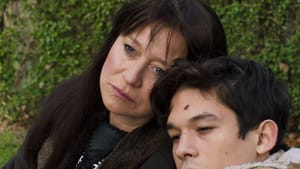Stay in the Loop
BSR publishes on a weekly schedule, with an email newsletter every Wednesday and Thursday morning. There’s no paywall, and subscribing is always free.
Femme fatale
Susanna Nicchiarelli's 'Nico, 1988'

Writer/director Susanna Nicchiarelli, in her new feature film Nico, 1988, paints a harsh but poignant portrait of the late music icon in a period when she was struggling to recapture her past glory. And Nico did struggle; hers was a glory she simultaneously missed and abhorred.
Nico was the stage name of Christa Päffgen, a German national and model who rose to fame in the 1960s working with the Velvet Underground and performing as a solo musician. She was a regular at Andy Warhol’s Factory and worked as an actor, appearing in Federico Fellini’s La Dolce Vita (1960) and Warhol’s Chelsea Girls (1966).
In the 1980s, she attempted a comeback tour, performing extensively in Europe and Japan. Her last concert took place in Berlin in June 1988. She died of a stroke that year, at age 49.
Nicchiarelli's script draws from several biographical sources. She spoke with people who witnessed Nico’s story, during both her ‘60s heyday and the last years of her life. The film primarily focuses on Nico’s final years and the complications that derailed her final tour.
As is often the case with people seeking the spotlight, Nico was a troubled soul. During her time at the Factory, she became addicted to heroin, an addiction she battled to the end of her life. Nonetheless, Nico struggled to move beyond her status as a countercultural figure, hoping to be viewed as a creative artist in her own right.
Better to burn out?
At the same time, Nico tried to correct some of her mistakes. She went on a methadone maintenance program and sought reconciliation with her estranged, equally troubled son Ari, played here by Sandor Funtek.
Nicchiarelli paints a compelling portrait of the mature Nico, both as an artist seeking to express her vision and as a woman seeking to pull together the strands of a chaotic life. Like many troubled artists, she is a difficult person to like: temperamental, narcissistic, volatile, even racist.
She mistreats almost everyone around her — her long-suffering band, the tour manager who loves her. Nicchiarelli uncompromisingly shows us Nico’s bad side. But her portrait is also gently compassionate as well, making her subject, in the end, oddly sympathetic.
Nicchiarelli’s instrument in bringing this portrait to life is the sublimely brilliant Trine Dyrholm. Dyrholm’s portrayal of Nico swings effortlessly from “Why do they put up with her?” to “How can you not love her?”
Much of the film focuses on Nico’s shows and it’s fascinating to watch the absurdities mount during this fallen star’s poorly organized tour. These scenes epitomize Nico’s struggles to be accepted as an artist apart from Warhol’s circle.
Nicchiarelli adapted Nico’s music for the film to capture live performances, with Dyrholm singing. You don’t have to be familiar with Nico’s originals to appreciate the intensity of these performances.
The brutal honesty, compassion, and nuance of Nicchiarelli’s portrait raise Nico, 1988 well above the usual “biopic of a screwed-up, has-been star” genre. Adding Dyrholm’s subtly powerful performance to the mix elevates the whole experience to a level even Nico might appreciate.
What, When, Where
Nico, 1988. Written and directed by Susanna Nicchiarelli. Opens August 31, 2018, at the Ritz at the Bourse, 400 Ranstead Street, Philadelphia. (215) 440-1184 or landmarktheatres.com.
Sign up for our newsletter
All of the week's new articles, all in one place. Sign up for the free weekly BSR newsletters, and don't miss a conversation.

 Gary L. Day
Gary L. Day